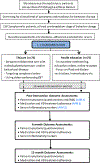Rationale and design of technology assisted stepped collaborative care intervention to improve patient-centered outcomes in hemodialysis patients (TĀCcare trial)
- PMID: 30208343
- PMCID: PMC6168366
- DOI: 10.1016/j.cct.2018.09.002
Rationale and design of technology assisted stepped collaborative care intervention to improve patient-centered outcomes in hemodialysis patients (TĀCcare trial)
Abstract
Most hemodialysis (HD) patients experience symptoms of depression, pain and fatigue that impair their health-related quality of life (HRQOL) significantly. These symptoms are associated with increased hospitalization and mortality, mediated by behavioral factors (e.g. non-adherence to medication and dialysis) and biological factors (e.g. inflammatory cytokines). Prior interventions to alleviate symptoms and improve HRQOL showed limited effectiveness in HD patients and their effect on bio-behavioral mediators is lacking evidence. It is imperative to improve patient-centered dialysis care and to address call from Kidney Disease Improving Global Outcomes (KDIGO) guidelines for integration of symptom assessment and management in routine HD-care. Technology-Assisted stepped Collaborative Care (TĀCcare) is a multi-center randomized controlled trial (RCT) of 150 diverse HD patients from Pennsylvania and New Mexico, designed to compare the effectiveness of a 12-week stepped collaborative care intervention (cognitive behavioral therapy, CBT) with an attention control arm of technology-delivered health education. Collaborative care provides an integrated multi-disciplinary structured management plan. Furthermore, a stepped approach to pharmacotherapy and/or CBT allows for individualization of treatment according to patients' clinical status, preferences and treatment response. To simplify the delivery of CBT and to minimize patient and provider burden, we will use live video-conferencing with patients in dialysis units. We will examine the effect of these interventions on patient symptoms, HRQOL, treatment adherence and inflammatory biomarkers. This RCT tests a readily implementable intervention that can be integrated in routine HD-care and will generate novel and meaningful insights on strategies to alleviate common symptoms and improve HRQOL in HD.
Keywords: Depression; Fatigue; Hemodialysis patients; Pain; Patient-centered Outcomes; Symptoms.
Copyright © 2018 The Authors. Published by Elsevier Inc. All rights reserved.
Conflict of interest statement
Conflicts of Interest
None
Figures
References
-
- Davison SN, Jhangri GS. Impact of pain and symptom burden on the health-related quality of life of hemodialysis patients. Journal of pain and symptom management March 2010;39(3):477–485. - PubMed
-
- Jhamb M, Parvez S, Abdel-Kader K, Unruh M, Steel J. Comparison of Prevalence and Predictors of Fatigue in Advanced Chronic Kidney Disease and Cancer patients. American Society of Nephrology Kidney Week Poster presentation, San Diego, CA: November, 2015.
-
- Moens K, Higginson IJ, Harding R, Euro I. Are there differences in the prevalence of palliative care-related problems in people living with advanced cancer and eight non-cancer conditions? A systematic review. Journal of pain and symptom management October 2014;48(4):660–677. - PubMed
-
- Cukor D, Peterson RA, Cohen SD, Kimmel PL. Depression in end-stage renal disease hemodialysis patients. Nature clinical practice. Nephrology December 2006;2(12):678–687. - PubMed
Publication types
MeSH terms
Grants and funding
LinkOut - more resources
Full Text Sources
Other Literature Sources
Medical
Miscellaneous




